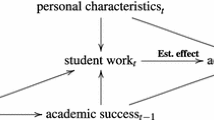Abstract
The purpose of this study was to investigate the relationship between students' prior work experience and subsequent success during the first year in an MBA program. We present a rationale for the use of work experience as a selection criterion (based on the training-readiness literature) but also present another argument (based on the career-stage literature) that counters the prevailing view about the appropriateness of this selection standard. Using data from a unique sample of 230 MBA students and controlling for such factors as the type of undergraduate program attended, undergraduate GPA, and total score on the Graduate Management Admission Test, prior work experience was found to account for only a small proportion of the variance in first-semester grades and was found to be unrelated to academic performance in the second semester. Taking these results and other existing empirical studies into account, there is little support for the view that previous work experience (as assessed by typical admission procedures) leads to higher levels of academic achievement. Implications for admissions policy, hiring companies, and those considering graduate study in business are discussed.
Similar content being viewed by others
REFERENCES
Ahmadi, M., Raiszadeh, F., and Helms, M. (1997). An examination of admission criteria for the MBA programs: A case study. Education 117: 540–546.
Allen, C. (1998, March 22). Minding their own business. The Washington Post Magazine, pp. 19-20.
America's best colleges. (1992, September 28). U.S. News and World Report, pp. 114, 116.
Arnold, K. D. (1993). Academically talented women in the 1980s: The Illinois valedictorian project. In K. Hulbert and D. Schuster (Eds.), Women's Lives Through Time: Educated Americans of the Twentieth Century, pp. 393–414. San Francisco: Jossey-Bass.
Berg, I. (1970). Education and Jobs: The Great Training Robbery. New York: Praeger.
Current Population Survey (1997a). Available on the Internet: http://www.census.gov/ population/socdemo/ms-la/95his06.txt.
Current Population Survey (1997b). Available on the Internet: http://www.census.gov/ population/socdemo/fertility/fert94/htab03.txt.
Dawes, R. M. (1975, February 28). Graduate admission variables and future success. Science 187: 721–723.
Dreher, G. F., Dougherty, T. W., and Whitely, B. (1985). Generalizability of MBA degree and socioeconomic effects on business school graduate's salaries. Journal of Applied Psychology 70: 769–773.
Dugan, M. K., Grady, W. R., Payn, B., Baydar, N., and Johnson, T. R. (Autumn, 1996). The importance of prior work experience for full-time MBA students: Evidence from the GMAT registrant survey. Selections: 1–9.
Elkin, G. (1995). Socialization and MBA programs. Journal of Management Education 19: 171–189.
Faver, C. A. (1983). Women, career orientation, and employment. Psychology of Women Quarterly 8: 193–197.
Gayle, J. B., and Jones, T. H. (1973). Admission standards for graduate study in management. Decision Sciences 4: 421–425.
Graham, L. D. (1991). Predicting academic success of students in a master of business administration program. Educational and Psychological Measurement 51: 721–727.
Gutherie, J. P., and Schwoerer, C. E. (1996). Older dogs and new tricks: Career stage and self-assessed need for training. Public Personnel Management 25: 59–72.
Hall, D. T. (1976). Careers in Organizations. Santa Monica, CA: Goodyear Publishing Company.
Hartnett, R. T., and Willingham, W. W. (1980). The criterion problem: What measure of success in graduate education? Applied Psychological Measurement 4: 281–291.
Higgins, C., Duxbury, L., and Lee, C. (1994). Impact of life-cycle stage and gender on the ability to balance work and family responsibilities. Family Relations 43: 144–150.
Isabella, L. A. (1987). The effect of career stage on the meaning of key organizational events. Journal of Organizational Behavior 9: 345–358.
Kaiser, P. R. (1978). Predictors of academic success for MBA students at Indiana University. Unpublished doctoral dissertation, Indiana University, Bloomington.
McClure, R. H., Wells, C. E., and Bowerman, B. L. (1986). A model of MBA student performance. Research in Higher Education 25: 182–193.
Mount, M. K. (1984). Managerial career stage and facets of job satisfaction. Journal of Vocational Behavior 24: 340–354.
Ornstein, S., Cron, W. L., and Slocum, J. W. (1989). Life stage versus career stage: A comparison test of the theories of Levinson and Super. Journal of Organizational Behavior 10: 117–133.
Pfeffer, J. (1977). Effects of an MBA and socioeconomic origins on business school graduate's salaries. Journal of Applied Psychology 62: 698–705.
Pitcher, B. (1972). A Comparison of the Prediction of First-Year Average Grades in Graduate Schools of Business for Interrupted and Uninterrupted Students (in Admission Test for Graduate Study in Business research summaries, April). Princeton, NJ: Educational Testing Service.
Raelin, J. A. (1985). Work patterns in the professional life cycle. Journal of Occupational Psychology 58: 177–187.
Schein, E. H. (1978). Career Dynamics: Matching Individual and Organizational Needs. Reading, MA: Addison-Wesley.
Schellhardt, T. D. (1998, November 10). Business schools struggle to lure more women. Wall Street Journal, B1, B18.
Schneider, L. M., and Briel, J. B. (1990). Validity of the GRE: 1988-1989 Summary Report. Princeton, NJ: Educational Testing Service.
Sternberg, R. J., and Williams, W. M. (1997). Does the Graduate Record Examination predict meaningful success in the graduate training of psychologists? A case study. American Psychologist 52: 630–641.
Tversky, A., and Kahneman, D. (1971). Belief in the law of small numbers. Psychological Bulletin 76: 105–110.
Van Fleet, D. D. (1995). Designing MBA programs with students in mind. Journal of Management Education 19: 373–379.
Wexley, K. N., and Latham, G. P. (1991). Developing and Training Human Resources in Organizations. New York: HarperCollins Publishers Inc.
Whetton, D. A., and Clark, S. C. (1996). An integrated model for teaching management skills. Journal of Management Education 20: 152–181.
Willingham, W. W. (1974). Predicting success in graduate education. Science 183: 273–278.
Author information
Authors and Affiliations
Rights and permissions
About this article
Cite this article
Dreher, G.F., Ryan, K.C. Prior Work Experience and Academic Achievement Among First-Year MBA Students. Research in Higher Education 41, 505–525 (2000). https://doi.org/10.1023/A:1007036626439
Issue Date:
DOI: https://doi.org/10.1023/A:1007036626439




